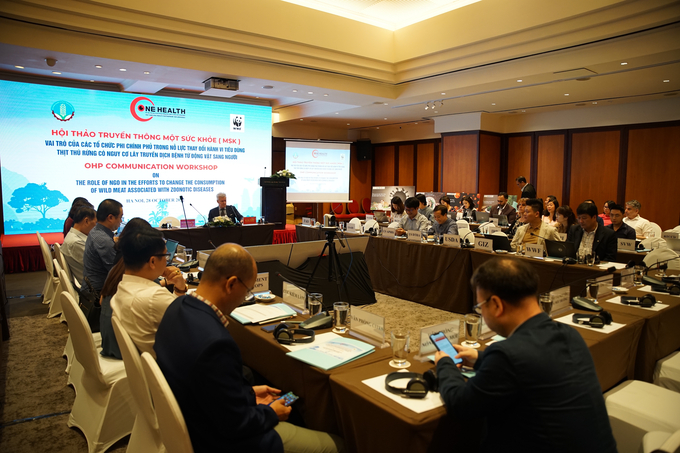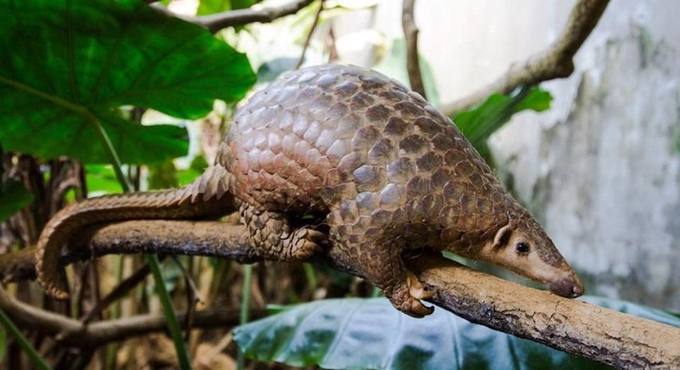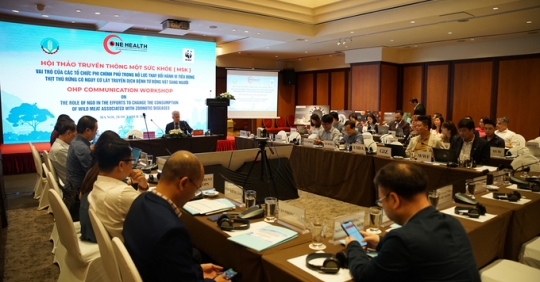NGOs are teaming up to change wildlife consumption behavior
On October 28, the Ministry of Agriculture and Rural Development, in cooperation with the International Organization for Conservation of Nature in Vietnam (WWF-Vietnam), co-chaired a communication workshop on “The Role of NGOs in Vietnam”. Efforts to change the consumption of game meat, which carries the risk of transmitting disease from animals to humans.
This is an event as part of agricultural cooperation and implementation of the One Health Partnership Framework for the Prevention of Zoonoses.
The workshop aimed to support the implementation of a set of goals of the One Health Partnership Framework for 2021-2025 under the co-chair mechanism of the Department of Agriculture and Rural Development, the Department of Health and the Department of Natural Environment with 29 international development partners and nearly 40 NGOs, mobilizing NGO resources and knowledge to prevent the risk of dangerous diseases from wildlife.
In addition, establish a framework and forum for dialogue for NGOs and multi-sectoral coordination to reduce the risk of animal-to-human transmission of diseases, strengthen food safety management through communication activities to reduce the risk of animal-to-human disease transmission Meat demand.

Communication workshop “The Role of Non-Governmental Organizations (NGOs) in Efforts to Change Game Meat Eating Behaviour, Where There is a Risk of Transmitting Diseases from Animals to Humans”.
Diseases in animals and the risk of transmission to humans are caused by the illegal importation, transport and slaughter of poultry and farm animals, particularly wild animals, which have transmitted the disease.
The epidemic situation in the world is changing unpredictably and requires the cooperation of governments and international partners, including the important role of NGOs.
The Vietnamese government has recently taken strong action against poaching and illegal wildlife trade. In 2020, a Wildlife Management Policy was signed and promulgated, mandating to halt imports of wildlife until new directions emerge and resolutely eliminating illegal wildlife trade and trading areas.
In addition, Vietnam has also actively cooperated with international organizations including WWF to save and release wild animals such as bears, saola, … via nature.
“In order to support Vietnam in developing an institutional framework to manage, control and ensure the safety of people, animals and the environment, and in particular to raise awareness of bushmeat consumption, it is necessary to join hands with stakeholders, especially NGOs, to have.
These are organizations that can provide knowledge, mobilize, fund, effectively support public health efforts, raise public awareness of food safety, reduce demand and ask the public to say no to wild game meat consumption,” said Mr. Nguyen Do Anh Tuan. Director of the Department of International Cooperation, Ministry of Agriculture and Rural Development.
Speaking on the side of the conference co-chair, WWF-Vietnam Conservation Director Mr. Bill Possiel called on NGOs and advocacy groups to work together to take action to change awareness and consumption habits of wild meat in Vietnamese strata of society.
“According to him, every NGO, civil society organization and professional social organization has its own important role and professional strength. But only by working together in Vietnam’s One Health program, the core of which is the Ministry of Agriculture and Rural Development, the Ministry of Health and the Ministry of Natural Resources and Environment, can we successfully protect the public health of wild species, as well as conservation and sustainable development natural ecosystems,” said Mr. Possiel.
In response to the One Health approach, WWF-Vietnam and Vietnam Agriculture Newspaper launched a communication campaign on October 21 to change bushmeat consumption behavior among urban consumers to protect public health and nature.
Accordingly, consumers are being educated about the serious risks of eating bushmeat so they can make their own choices to change their behavior for their own health and that of the community.
The campaign is also aimed at the general public to change societal perceptions and prevent the risk of further pandemic outbreaks. The campaign has been tested in Vietnam, Laos and Cambodia, where wild consumption is widespread.
Encouraging NGO communication to change wildlife consumption patterns
Mr. Nguyen Van Long, Head of Wildlife Health and Conservation – WCS Vietnam, discussed the role of NGOs in communication activities to change wildlife consumption patterns. This agency focuses on concentrating on research activities and searching for pathogens in wild animals to provide scientific evidence, strengthening and supporting communication activities and activities for changing and reviewing Vietnam’s policy on disease prevention and control, wildlife trafficking, wildlife trafficking and wildlife consumption in the Future.
“In the near future, WCS will coordinate with the Department of Animal Health – Department of Agriculture and Rural Development – the search and detection of SARS-CoV viruses and strains of the coronavirus family in domesticated wild populations or wild populations of wild animals in close contact with farms and sanctuaries,” said Mr. Long, “this will be solid scientific evidence that wildlife has been, is, and will be a source of protection and disease transmission through human-wildlife contact and communication activities.
SAVE Vietnam Wildlife designs communication programs and campaigns based on the wildlife supply chain from hunting, transportation, captive breeding to restaurants and consumers.
Despite the veterinary law, there is still a gap in the issue of wildlife farm management, according to Mr. Pham Van Thong, head of the organization’s conservation research department. Hence, this is also the topic for this NGO to focus on promoting communication.

The use of game meat increases the risk of transmission of infectious diseases.
Regarding the strategies and activities of social organizations, NGOs and the change in consumption patterns of game meat, Ms. Nguyen Thuy Hang, communication director of Pan Nature, said that there are no regulations to punish consumers, so communication is very important.
Pan Nature’s activities are divided into two areas, in which they address the public with a wildlife information website with educational content on conservation and warnings on wildlife consumption; Build communication campaigns on social networks Facebook, Youtube, focused on potential objects of wildlife consumption to change the perception of a segment of consumers. She also greatly appreciated the role of the media in raising public awareness and fighting wildlife trade through wildlife trade training, propaganda sessions and field trips.
As part of the One Health Partnership Framework mechanism to communicate to change wild animal consumption, experts from the National Family Health Organization FHI360, the HSI Organization for Animal Welfare, the Cargill Group’s Transform Project and TE Food have proposed upcoming solutions and activities to change wild animal consumption change.
Accordingly, experts suggest that political communication should be promoted in addition to mass communication, since politics has a great impact on consumer behavior; Promoting the consumption of poultry and fish products for family meals to indirectly contribute to wildlife consumption patterns; Promoting wildlife conservation experiences for individuals and organizations; Improving the knowledge of target groups directly related to dealing with illegal wildlife trade and consumption, including foresters and customs; to control animal husbandry and safe consumption of wild animals to prevent illegal consumption and exploitation of wild animals.

